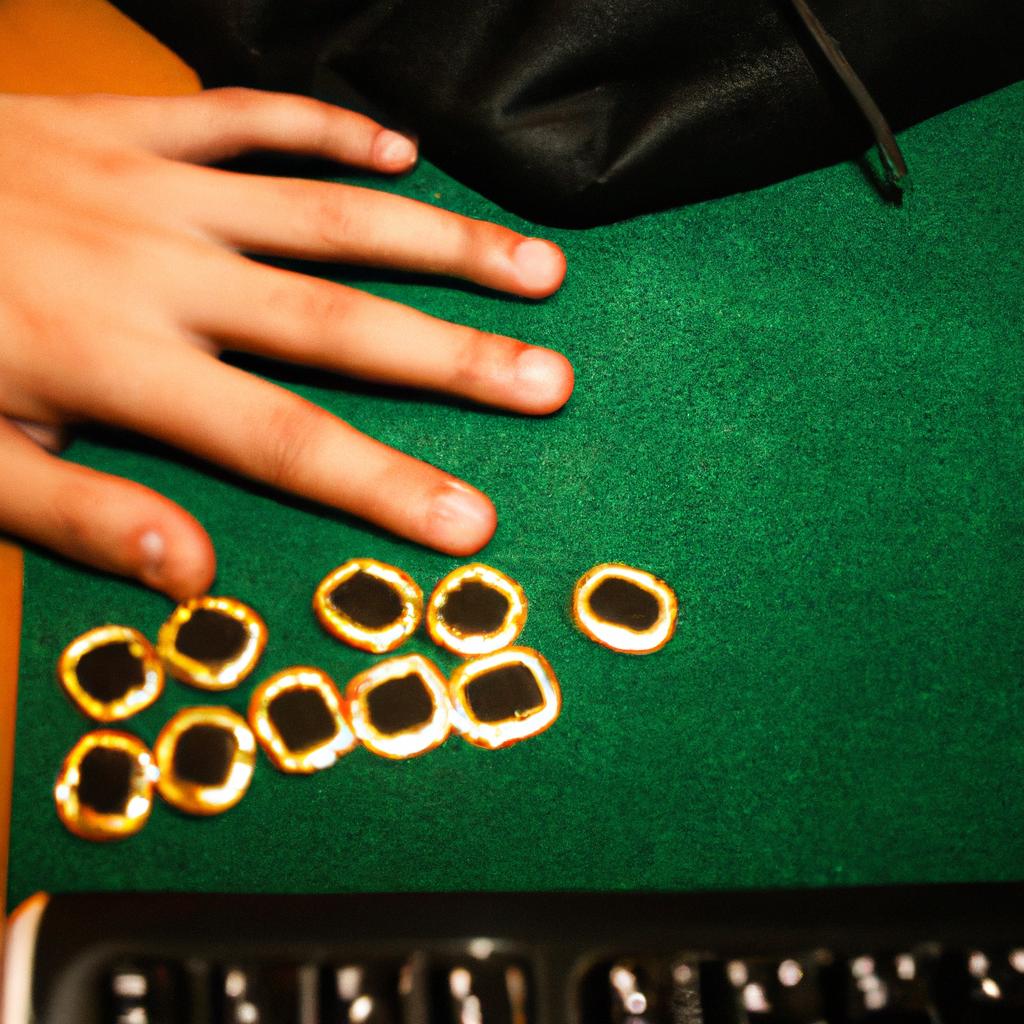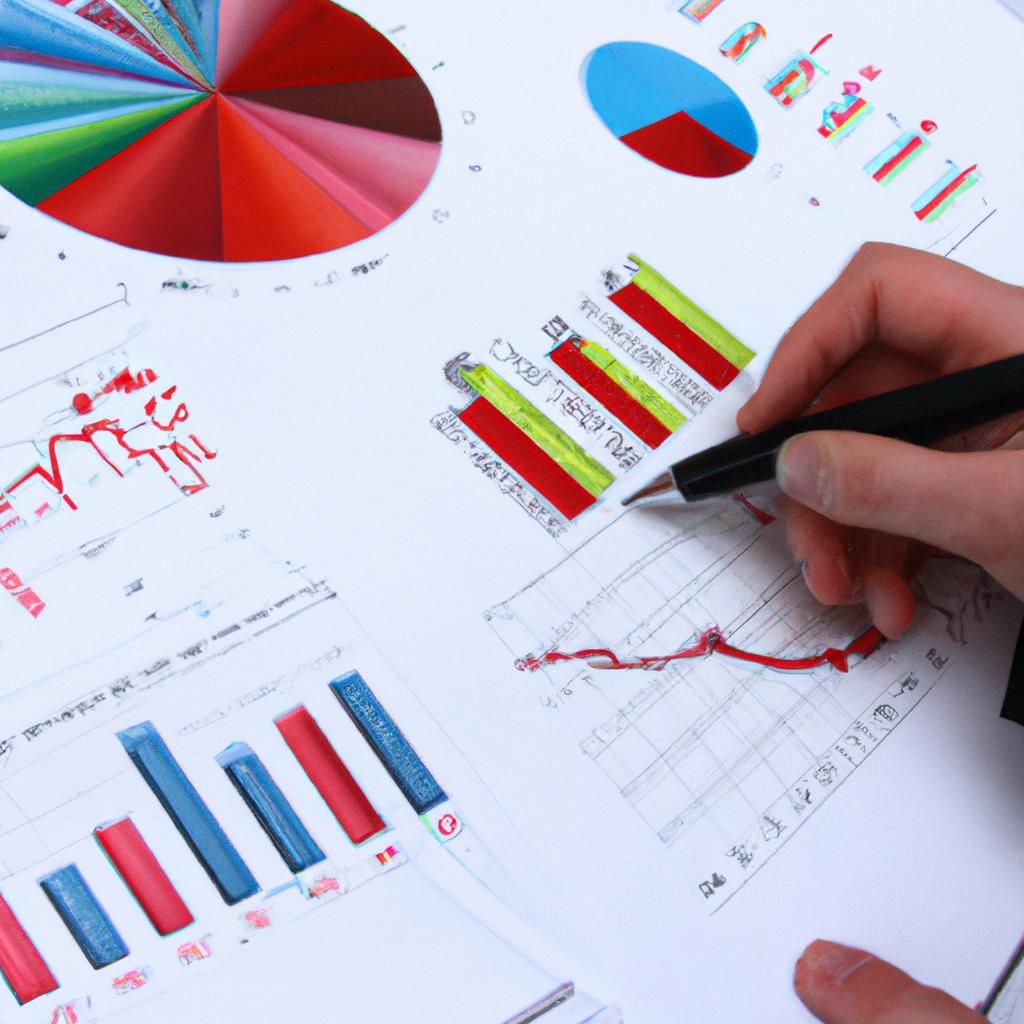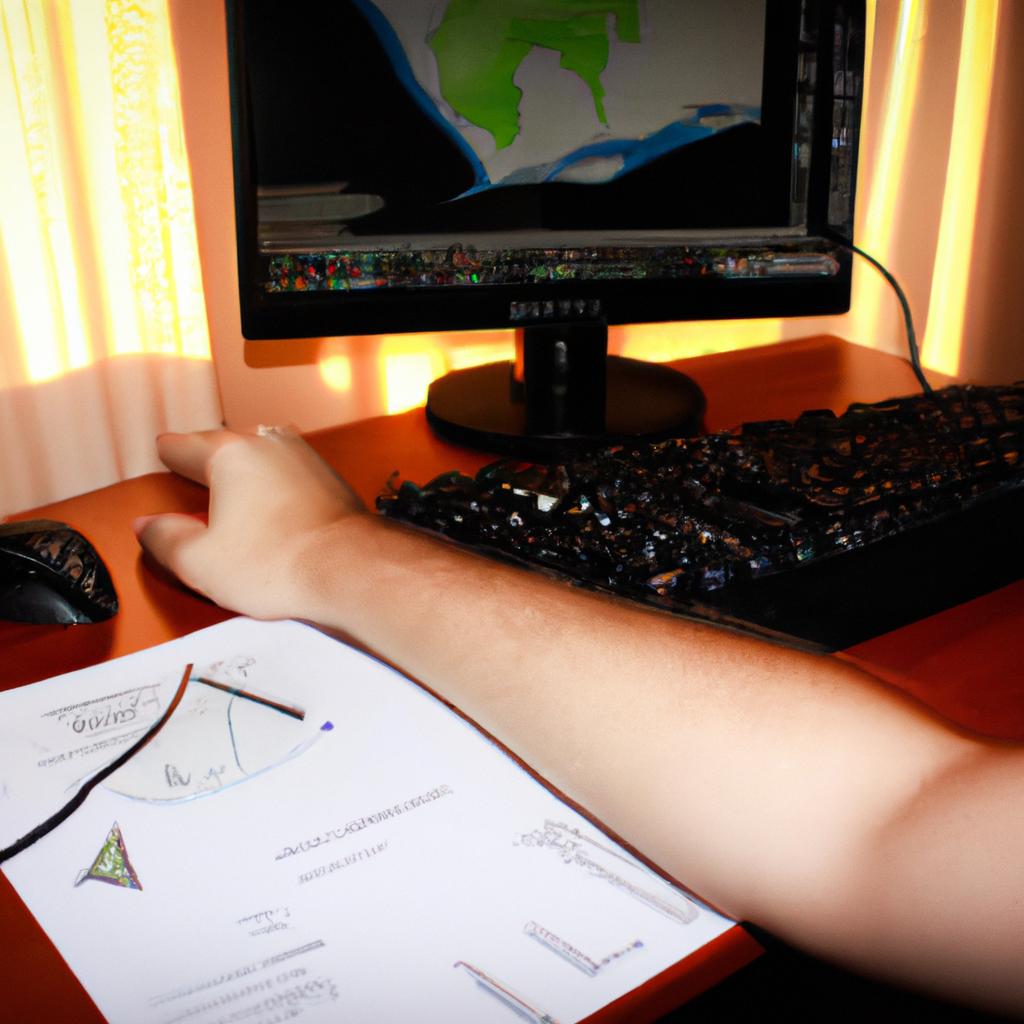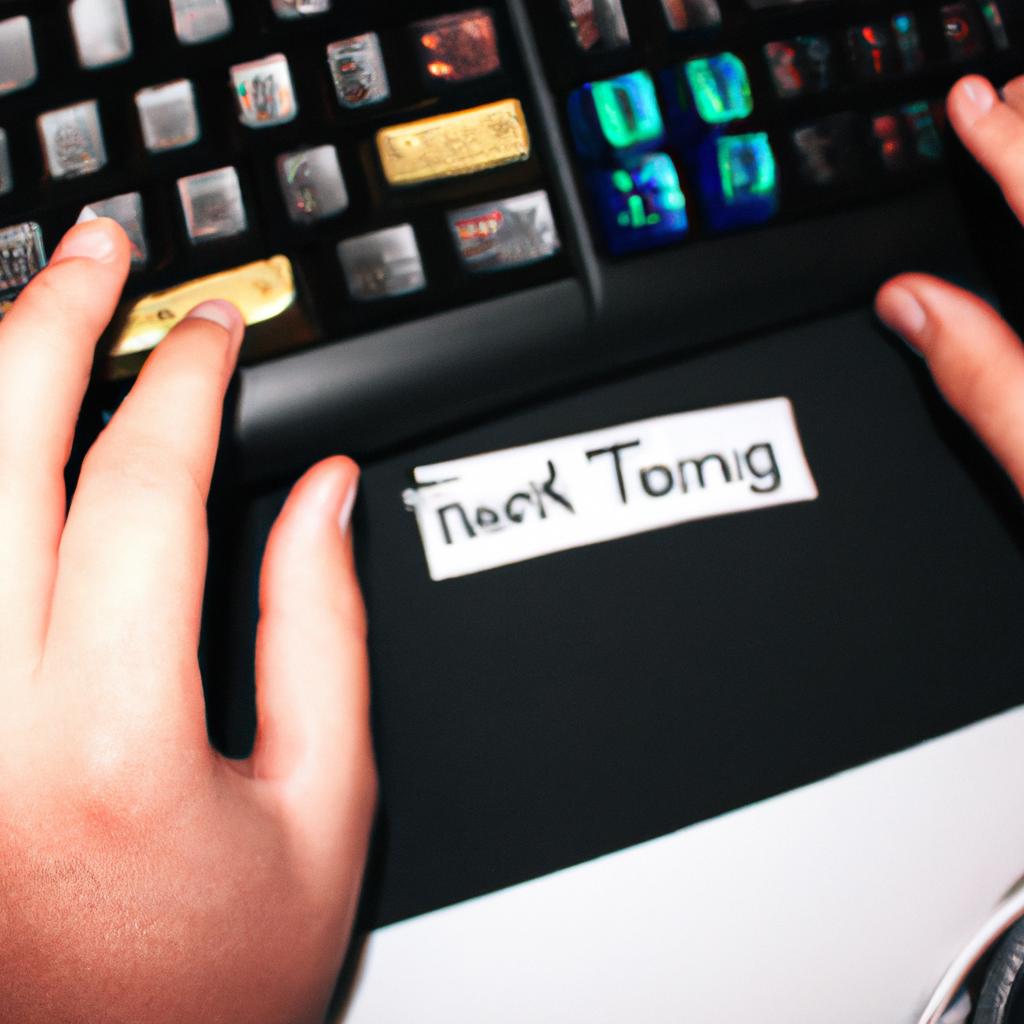The Grand Exchange system is a pivotal component of the popular online game Runescape, facilitating gold trading mechanics within a virtual marketplace. With its inception in 2007, this innovative feature revolutionized player-to-player transactions and greatly impacted the in-game economy. This article explores the intricacies of the Grand Exchange system and delves into its significance for players seeking to navigate the world of Runescape.
To illustrate the importance of the Grand Exchange system, consider a hypothetical scenario where a player embarks on a quest to obtain rare armor piece known as “Dragon Platebody.” Traditionally, acquiring such an item would require extensive engagement with other players through various forums or chats, negotiating prices and ensuring both parties are satisfied with the trade. However, with the advent of the Grand Exchange system, players can now simply list their desired items at specified prices and wait for potential buyers or sellers to meet their terms. This streamlined approach not only saves time but also offers convenience by eliminating unnecessary interactions and reducing transactional uncertainties.
Overview of the Grand Exchange system
Imagine you are a player in the popular online game Runescape, and you have just acquired a rare item – a Dragon Scimitar. You know that this item holds immense value within the game’s virtual economy, but how do you go about finding someone willing to buy it at a fair price? This is where the Grand Exchange system comes into play.
The Grand Exchange is an innovative trading platform introduced in 2007 as part of an update to Runescape. It revolutionized the way players engage in commerce by providing a centralized marketplace for buying and selling items. Gone were the days of standing in crowded areas shouting out trade offers; now, players could access a vast network of buyers and sellers with ease.
To better understand the mechanics of the Grand Exchange, let us consider its key features:
- Trade Offers: Players can create trade offers specifying what they want to buy or sell, along with their desired prices. These offers are then listed on the exchange for others to browse and respond to.
- Item Listings: The Grand Exchange maintains an extensive catalog of available items, categorizing them based on type and rarity. Each listing contains information such as current market value and recent transaction history.
- Price Fluctuations: Much like real-world financial markets, prices of items within the Grand Exchange fluctuate over time due to supply and demand dynamics. Tracking these fluctuations allows players to make informed decisions when creating or accepting trade offers.
- Transaction Limitations: To prevent manipulation or monopolization of certain items, there are limitations on both the quantity traded per offer and total transactions per day.
Consider this example scenario: Player A wants to purchase 100 logs from other players using the Grand Exchange. They set their price at 50 gold coins each, hoping to find sellers who meet their requirements. Meanwhile, Player B has been stockpiling logs obtained through woodcutting activities and decides to sell their surplus. They list 100 logs at a price of 40 gold coins each on the Grand Exchange. Eventually, Player A’s buy offer and Player B’s sell offer match, resulting in a successful transaction.
In summary, the Grand Exchange system provides players with an efficient and convenient means of trading items within the virtual world of Runescape. By creating trade offers, browsing item listings, tracking price fluctuations, and adhering to transaction limitations, players can engage in dynamic market interactions that mirror real-world economic principles.
Next, we will explore how players can access the Grand Exchange and start participating in this vibrant marketplace.
How to access the Grand Exchange
To further grasp the mechanics of the Grand Exchange system in Runescape, let us consider an example scenario. Imagine a player named John who wishes to sell his stack of gold coins for maximum profit. He decides to utilize the Grand Exchange, a central hub where players can trade items and currency with each other.
The Grand Exchange offers several advantages that make it an attractive option for players like John:
-
Convenience: Unlike traditional methods of trading, where players had to manually find buyers or sellers, the Grand Exchange provides a streamlined platform that allows transactions to occur even when the player is offline. This convenience saves time and effort for players and promotes efficient trading.
-
Price Discovery: The system automatically adjusts prices based on supply and demand dynamics. Through this mechanism, players are able to observe current market trends and adjust their selling or buying strategies accordingly. Price fluctuations within the exchange create opportunities for savvy traders like John to earn profits by capitalizing on favorable price differences.
-
Safety and Security: Trading through the Grand Exchange minimizes risks associated with scamming or fraudulent exchanges. By acting as an intermediary between buyers and sellers, the system ensures that both parties receive what they agreed upon before completing a transaction.
-
Increased Market Accessibility: With thousands of active players participating in Runescape at any given time, the Grand Exchange serves as a centralized marketplace where individuals from various locations can engage in trade. This broadens potential buyer pools for sellers like John, increasing market liquidity and chances of finding profitable trades.
| Advantages of Using the Grand Exchange |
|---|
| Convenient trading platform |
| Transparent price discovery |
| Enhanced safety measures |
| Increased market accessibility |
As highlighted above, these benefits contribute to making the Grand Exchange an integral part of Runescape’s gameplay experience. In our subsequent section about “Understanding the buying and selling process,” we will delve deeper into the details of how players like John can effectively utilize this system to maximize their trading potential.
Understanding the buying and selling process
Understanding the buying and selling process in the Grand Exchange is crucial for successful gold trading. Let’s take a closer look at how this system operates.
To illustrate, imagine you are a player looking to sell 100 amulets of strength in Runescape. You visit the Grand Exchange and enter your offer at a competitive price. The game then matches your offer with potential buyers who are willing to pay that amount or more. If there are no immediate buyers, your offer will be listed on the exchange until someone decides to purchase it.
When buying items in the Grand Exchange, the process is similar but reversed. Suppose you want to buy a dragon scimitar for an upcoming quest. You submit your desired price and quantity, and the system searches for sellers offering their scimitars within that range. Once again, if there are no immediate sellers available, your request will remain active until a seller appears.
The buying and selling process in the Grand Exchange can be summarized as follows:
- Offers: Players create offers specifying either what they want to buy or sell.
- Matching: The system finds matching offers based on price and quantity criteria.
- Transactions: When both buyer and seller agree on terms, transactions occur.
- Listing: Offers not immediately matched are listed until fulfilled or canceled.
Now let us delve into some emotional aspects of trading through bullet points:
- Excitement: Discovering great deals or rare items creates a sense of excitement among players.
- Frustration: Waiting for offers to match can be frustrating when seeking urgent purchases or sales.
- Satisfaction: Successfully making profitable trades brings satisfaction to players’ gaming experiences.
- Competition: Engaging with other players in trade adds a competitive element to gameplay.
Additionally, here is a table summarizing key steps involved in the buying and selling process:
| Step | Description |
|---|---|
| Place Offer | Create an offer indicating what item(s) you want to buy or sell. |
| Matching | The system searches for matching offers based on price and quantity criteria. |
| Transaction | When both parties agree on terms, a transaction occurs, transferring items and gold. |
| Listing | Offers that are not immediately matched remain listed until fulfilled or canceled by the player. |
Understanding the mechanics of buying and selling in the Grand Exchange is essential to navigate this virtual marketplace effectively. In the upcoming section about “Tips for successful gold trading,” we will explore strategies and techniques to maximize your profits and minimize risks when engaging in these transactions.
Tips for successful gold trading
Understanding the buying and selling process in the Grand Exchange system is crucial for successful gold trading. In this section, we will delve deeper into the mechanics of how players can engage in efficient transactions within the game.
To illustrate these processes, let’s consider an example: Player A wants to sell 500 pieces of gold ore, while Player B is looking to buy them. Both players access the Grand Exchange interface, where they can set their desired price per unit and quantity. Once they input their offers, the system automatically matches compatible buyers and sellers based on their prices and quantities requested.
When a match occurs, both parties receive notifications informing them of the trade opportunity. They have a limited time window to accept or decline the offer before it expires. If accepted, the transaction takes place instantly, and both players’ inventories are updated accordingly. The entire process is automated, making it convenient for millions of Runescape players worldwide.
Successful gold trading relies on certain strategies that can enhance your chances of securing profitable deals:
- Keep an eye on market trends: By monitoring fluctuations in item prices over time, you can identify patterns that may help you predict future changes. This knowledge allows you to adjust your offers strategically.
- Be patient: Sometimes, finding suitable trades at desirable prices requires waiting for extended periods. Avoid rushing into unfavorable deals out of impatience; instead, exercise patience until better opportunities arise.
- Diversify your portfolio: Rather than solely focusing on one particular item or resource, diversify your investments across different commodities. This spreads risk and increases your chances of profiting from various markets.
- Stay informed about updates: Regularly check official announcements regarding new content releases or modifications to existing gameplay mechanics. Staying up-to-date ensures you don’t miss out on potential advantages or get caught off-guard by sudden changes.
In addition to understanding these strategies, having a clear grasp of key terms used during gold trading facilitates smoother interactions with other players. Here is a table summarizing some essential terms:
| Term | Definition | Example |
|---|---|---|
| Buy offer | The price and quantity at which a player wants to buy | Player A offers 500 gold ore for 100 coins each |
| Sell offer | The price and quantity at which a player wants to sell | Player B offers to buy 500 gold ore for 110 coins each |
| Match | When the system finds compatible buyer and seller offers | Player A’s sell offer matches with Player B’s buy offer |
| Trade window | Time frame during which players can accept or decline an offer before it expires |
Limitations and restrictions of the Grand Exchange
Section 3: Limitations and Restrictions of the Grand Exchange
Imagine you are a seasoned player in the world of Runescape, looking to make a substantial investment in gold. You have carefully analyzed market trends and identified an opportunity for profit through strategic trading on the Grand Exchange. However, before diving headfirst into this endeavor, it is essential to understand the limitations and restrictions that exist within the system.
One significant limitation of the Grand Exchange is its price cap. The maximum value at which items can be traded limits potential profits for players dealing with high-value commodities. For instance, let’s consider the hypothetical case of a player who wishes to trade rare cosmetic items worth billions of gold coins. Due to the price cap, they would be unable to sell these items at their true market value, potentially resulting in missed opportunities or reduced earnings.
Furthermore, there are certain restrictions imposed by Jagex (the creators of Runescape) to maintain fair gameplay and prevent exploitation. These include limitations on item quantity per trade and daily buying/selling limits for specific items. While these measures aim to create a level playing field for all players, they may hinder large-scale operations or restrict traders from taking advantage of sudden market fluctuations.
To gain further insight into these limitations and restrictions, let us examine them in more detail:
- Price Cap: The Grand Exchange enforces a maximum tradeable value for each item category. This prevents extreme inflation or deflation caused by exorbitant prices but also hampers those seeking substantial returns on high-value trades.
- Quantity Limits: Players face restrictions on how many units of an item they can buy or sell within a single trade transaction. This ensures that no individual player can monopolize resources completely but may impede efficient bulk transactions.
- Daily Trading Limits: Certain sought-after items come with daily purchase or sale limits per account. While this encourages fair distribution among players, it curbs potential profits when demand surpasses supply.
- Item Restrictions: Some items, particularly those obtained through quests or achievements, may have trade restrictions imposed by the game developers. This preserves their exclusivity and prevents them from flooding the market.
Despite these limitations and restrictions, the Grand Exchange remains a valuable tool for gold trading in Runescape. By understanding its mechanics and working within these constraints, players can still achieve considerable success in the marketplace. In our next section on “Future developments and updates to the system,” we will explore how Jagex plans to address some of these limitations while continuously improving the overall trading experience.
Future developments and updates to the system
The Grand Exchange System: Gold Trading Mechanics in Runescape Game
Limitations and Restrictions of the Grand Exchange
In examining the limitations and restrictions of the Grand Exchange system, it is important to understand that while it provides a convenient platform for players to trade items, there are certain factors that can affect its efficiency. One example is the fluctuation of prices due to supply and demand dynamics within the game’s economy.
One limitation arises from the fact that players cannot place buy or sell offers below or above specified price margins set by the system. This restriction ensures that trades occur within a reasonable price range but may prove frustrating when attempting to make deals at more favorable rates. Furthermore, there are also limits on how many trades a player can conduct within a given time frame, which serves as an anti-botting measure but can hinder experienced traders who wish to engage in multiple transactions simultaneously.
Despite these limitations, the Grand Exchange system has continually evolved with updates aimed at improving user experience and expanding its functionality. Jagex, the developer of RuneScape, regularly introduces new features based on player feedback and market trends. For instance:
- The introduction of “Grand Exchange Collection Boxes” allowed players to conveniently collect their traded items without needing physical presence near the exchange.
- A recent update implemented “Price Checking,” enabling users to quickly assess item values before listing them on the exchange.
- An additional feature called “Player-Owned Shops” was introduced, allowing players to create personalized shops where they could set prices for their own goods independently.
These developments have contributed to enhancing trading experiences within RuneScape’s virtual marketplace. However, it is worth noting that despite continuous improvements, some challenges persist. It remains crucial for developers to strike a balance between providing convenience and maintaining fair economic gameplay for all participants.
| Limitation/Restriction | Description |
|---|---|
| Price Margin Constraints | Players must adhere to the predetermined price range for trade offers. |
| Trade Volume Restrictions | There are limitations on the number of trades a player can conduct. |
| Botting Prevention | Measures in place to deter automated trading through bots and scripts. |
In conclusion, while the Grand Exchange system in RuneScape offers numerous benefits and streamlines the process of gold trading, it is not without its limitations and restrictions. These factors include price margins constraints, trade volume restrictions, and measures to prevent botting activities. However, continuous updates and improvements by Jagex have aimed at addressing these challenges and providing players with an enhanced trading experience within the game’s economy.
Next section: Future Developments and Updates to the System




